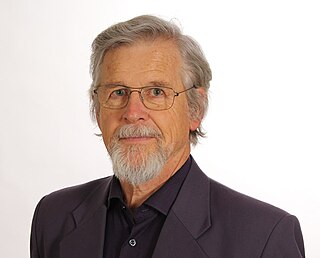Ethnologue: Languages of the World is an annual reference publication in print and online that provides statistics and other information on the living languages of the world. It is the world's most comprehensive catalogue of languages. It was first issued in 1951, and is now published by SIL International, an American evangelical Christian non-profit organization.
Warrongo is an Australian Aboriginal language, one of the dozen languages of the Maric branch of the Pama–Nyungan family. It was formerly spoken by the Warrongo people in the area around Townsville, Queensland, Australia. Its last native speaker was Alf Palmer, who died in 1981.

Robert Henry Lawrence Phillipson is Professor Emeritus in the Department of Management, Society and Communication at Copenhagen Business School in Denmark. He is best known for his seminal work on linguistic imperialism and language policy in Europe.

International Mother Language Day is a worldwide annual observance held on 21 February to promote awareness of linguistic and cultural diversity and to promote multilingualism. First announced by UNESCO on 17 November 1999, it was formally recognized by the United Nations General Assembly with the adoption of UN resolution 56/262 in 2002.

The Linguistic Society of America (LSA) is a learned society for the field of linguistics. Founded in New York City in 1924, the LSA works to promote the scientific study of language. The society publishes three scholarly journals: Language, the open access journal Semantics and Pragmatics, and the open access journal Phonological Data & Analysis. Its annual meetings, held every winter, foster discussion amongst its members through the presentation of peer-reviewed research, as well as conducting official business of the society. Since 1928, the LSA has offered training to linguists through courses held at its biennial Linguistic Institutes held in the summer. The LSA and its 3,600 members work to raise awareness of linguistic issues with the public and contribute to policy debates on issues including bilingual education and the preservation of endangered languages.
The Society for the Study of the Indigenous Languages of the Americas (SSILA) is an international organization founded in 1981 devoted to the study of the indigenous languages of North, Central, and South America.

Multilingualism is the use of more than one language, either by an individual speaker or by a group of speakers. It is believed that multilingual speakers outnumber monolingual speakers in the world's population. More than half of all Europeans claim to speak at least one language other than their mother tongue; but many read and write in one language. Being multilingual is advantageous for people wanting to participate in trade, globalization and cultural openness. Owing to the ease of access to information facilitated by the Internet, individuals' exposure to multiple languages has become increasingly possible. People who speak several languages are also called polyglots.
Maurice Tadadjeu was a Vice-President of the African Union's Economic, Social and Cultural Council of Central Africa.
The Endangered Language Fund (ELF) is a small non-profit organization based in New Haven, Connecticut. ELF supports endangered language maintenance and documentation projects that aim to preserve the world's languages while contributing rare linguistic data to the scientific community.

Ganesh Narayandas Devy is an Indian cultural activist, literary critic and former professor of English. He is known for the People's Linguistic Survey of India and the Adivasi Academy created by him. He is credited with starting the Bhaashaa research and Publication Centre. He writes in three languages—Marathi, Gujarati and English. His first full-length book in English is After Amnesia (1992). He has written and edited close to ninety books in areas including Literary Criticism, Anthropology, Education, Linguistics and Philosophy.
Jerzy Jarosław Smolicz AM, also known as J. J. "George" Smolicz, was a Polish-born sociologist and educationalist acknowledged widely as a major contributor to cultural understanding in Australia. A key figure in developing and implementing Australia's multicultural and language policies, he was a Senior Consultant on Multiculturalism to the Fraser government and for 20 years was Chair of the Multicultural Education Committee in South Australia.
Susan Gal is the Mae & Sidney G. Metzl Distinguished Service Professor of Anthropology, of Linguistics, and of Social Sciences at the University of Chicago She is the author or co-author of several books and numerous articles on linguistic anthropology, gender and politics, and the social history of Eastern Europe.

Margaret Florey is an Australian linguist whose work focuses on the revitalization and maintenance of Indigenous Australian languages. She has documented changes in contemporary speech, such as the expression Yeah, no which is becoming more prevalent in Australia.
Zubair Torwali is a community activist, linguist and educator based in Bahrain, Pakistan who has sought to preserve and promote Pakistan's Dardic cultures and languages. He has authored and supervised a number of books in and about Torwali. His book in English, Muffled Voices, provides insight into Pakistan's social, cultural, and political issues. Zubair Torwali is the Editor of "We Mountains" magazine which covers the culture of the Pakistani Himalayas. The author is a prolific writer of research papers and articles written for English dailies and weeklies of Pakistan. He is the founder of Idara Baraye Taleem-o-Taraqi, an organisation promoting the rights of marginalised language communities of northern Pakistan. He is author, researcher and public speaker. He is a member of the Human Rights Commission of Pakistan, a Fellow of Japan's 2013 Asian Leadership Fellow Program and was shortlisted for the International Bremen Peace Award 2015. Mr. Torwali is also a Public Peace Prize laureate "…for his extraordinary commitment to giving a voice to the unheard by helping increase literacy in the indigenous people of Northern Pakistan". He was awarded the 2012 Hellman-Hammett Grant by Human Rights Watch." In 2021 I.B.T. whose Director is Zubair Torwali was chosen for the Linguapax International Award. A graduate of Jahanzeb College in Swat, Pakistan, he has completed master's studies at University of Peshawar.

John C. Maher is an Irish-British linguist, academic and author, professor of linguistics at International Christian University, Tokyo, Japan.

Tove Anita Skutnabb-Kangas was a Finnish linguist and educator. She is known for coining the term linguicism to refer to discrimination based on language.

Eastern Kata-vari also locally known as Shekhani is a variety of the Kata-vari language spoken in Chitral district of Khyber-Pakhtunkhwa province of Pakistan. The Kamviri language is also known as Shekhani. The Khowar name for the dialect is Sheikhwar which means "Language of the Sheikhs or converts." Some linguists consider Shekhani or Eastern Kata-vari a different language due to the isolation from other Nuristani languages other than Kamviri. Kamviri Shekhani is different than Eastern Kata-vari which is also called Shekhani.
The Catalonia International Prize is a Spanish international prize, awarded every year since 1989 by the Generalitat de Catalunya. The award recognizes the work of people who have not only contributed to the development of culture, science or economics, but have also stood out for having completed their work with a high ethical and humanistic commitment.

BASAbali is a non-profit online platform established in 2011, focusing on civic engagement and promotion of the Balinese language. In addition to the Balinese language, BASAbali has a sister platform, BASAsulsel, serving the province of South Sulawesi, supporting the Makassarese and Buginese languages.









